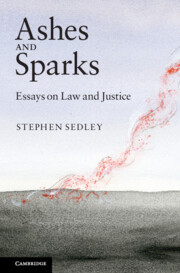Book contents
- Frontmatter
- Contents
- Preface
- Acknowledgements
- PART I History
- PART II Law
- PART III Justice
- 24 The right to know
- 25 The moral economy of judicial review
- 26 Policy and law
- 27 Responsibility and the law
- 28 The Crown in its own courts
- 29 Human rights – who needs them?
- 30 Fundamental values – but which?
- 31 Overcoming pragmatism
- 32 Sex, libels and video-surveillance
- 33 This beats me
- 34 Public inquiries: a cure or a disease?
- 35 Human rights: a twenty-first century agenda
- 36 Are human rights universal, and does it matter?
- 37 Bringing rights home: time to start a family?
- 38 The four wise monkeys visit the marketplace of ideas
- Index
31 - Overcoming pragmatism
Published online by Cambridge University Press: 05 June 2012
- Frontmatter
- Contents
- Preface
- Acknowledgements
- PART I History
- PART II Law
- PART III Justice
- 24 The right to know
- 25 The moral economy of judicial review
- 26 Policy and law
- 27 Responsibility and the law
- 28 The Crown in its own courts
- 29 Human rights – who needs them?
- 30 Fundamental values – but which?
- 31 Overcoming pragmatism
- 32 Sex, libels and video-surveillance
- 33 This beats me
- 34 Public inquiries: a cure or a disease?
- 35 Human rights: a twenty-first century agenda
- 36 Are human rights universal, and does it matter?
- 37 Bringing rights home: time to start a family?
- 38 The four wise monkeys visit the marketplace of ideas
- Index
Summary
Reviewing Judge Richard Posner's book Overcoming Law for the London Review of Books in 1995, and having read some of his many other writings, I had formed a mental image of a pugnacious, fast-talking polymath who would tolerate no contradiction. When, not long afterwards, Posner (then chief judge of the Seventh Circuit Court of Appeals) became an honorary bencher of the Inner Temple, I met a quiet-spoken man who was interested in other people's ideas. This is one of several reasons why it is better not to know the authors you are reviewing.
The sixth form at the boys' boarding school where I was educated was addressed on one occasion by an outside speaker, a sanctimonious pedagogue who announced to us that he and his wife – bootfaced on the platform beside him – had overcome sex. He counselled us to do the same. To an audience of overheated seventeen-year-olds whose only ambition was for sex to overcome them, the proposition was as mystifying as a book written by a judge and called Overcoming Law.
The judge in this case, Richard Posner, is the Chief Judge of the United States Court of Appeals for the Seventh Circuit. He is also a senior lecturer in law at Chicago University and a widely published polemicist. At the heart of his polemics are three pulses, legal pragmatism, Millian liberalism and legal economics, which Posner believes beat in sympathy.
- Type
- Chapter
- Information
- Ashes and SparksEssays On Law and Justice, pp. 302 - 310Publisher: Cambridge University PressPrint publication year: 2011



